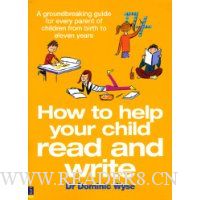How to Help Your Child Read and Write
基本信息·出版社:Prentice Hall ·页码:192 页 ·出版日期:2008年04月 ·ISBN:1405840242 ·International Standard Book Number:1405840242 ·条形 ...
| 商家名称 |
信用等级 |
购买信息 |
订购本书 |
|
|
 |
How to Help Your Child Read and Write |
 |
|
 |
How to Help Your Child Read and Write |
 |

基本信息·出版社:Prentice Hall
·页码:192 页
·出版日期:2008年04月
·ISBN:1405840242
·International Standard Book Number:1405840242
·条形码:9781405840248
·EAN:9781405840248
·装帧:平装
·正文语种:英语
·套装数量:2
内容简介 在线阅读本书
It seems that concern around the literacy of our children has never been more prevalent in the press and media. Every day we hear new stories of failing schools and young adults leaving education without the basic reading and writing skills they need to fulfil their potential. This groundbreaking new book will help you to help your children to develop a love of reading, writing and learning in general. It will prove vital to the thousands of parents who know that their child's early successes in reading and writing could hold the key to a successful academic and professional future. The book sets out to answer all the questions that parents ask themselves about their child's reading and writing development: * When should I start reading to my child? * What should I read to them? * When I should I encourage my child to write? * What level of reading and writing should my child be at now? * What books should my child be reading? * What about school? Shouldn't they be teaching my child the basics? Offering independent support to parents, the book will to help you to respond positively to the demands of your child's literacy needs. Covering ages from birth right through to age 11, and conveniently split in to age specific sections, the book will help you to ensure that your child's learning is an organic, natural and highly enjoyable experience. You don't need to be an expert English teacher yourself either. Just by following the simple guidance and advice contained in this book will help you to give your children the head start they need. * Find out what kinds of books are suitable for your child. * Discover a world of engaging and fascinating literature for children of all ages. * Learn from the author's extensive 10-year study on literacy. * See how you can actively support your child in their reading and writing and how you can get involved. * Learn about the impact of computer games, TV and modern technology on your child's literacy.
作者简介 Dominic Wyse has a strong international reputation in the field of the teaching and learning of reading and writing. He is a Lecturer in Primary and Early Years Education at the University of Cambridge. His main research interests include the teaching of English; creativity; and the study of childhood. He has appeared recently on BBC Newsnight, the Today programme on BBC Radio 4 and BBC News 24 to offer academic comment on government proposals for the teaching of reading and the National Literacy Strategy.
目录 Before you start PART 1 Reading Chapter 1: Birth to age four *When does reading begin? *Yes you can read with a baby! *Wonderful texts - how to choose the best books at this age; fiction or non-fiction, including a recommended list of books *It's not just about books print and other text in the child's environment *The difference between print and pictures *Understanding that text means something *Playing at reading *Favourite books *Remembering phrases from favourite books *What's in the picture? Using pictures to help with reading *Orientation of texts *The most important words in the world the name of your child *How to store books so your child can access them Chapter 2: Age four to seven *Reading the words in a sentence; pointing at the words *Reading schemes (basal readers) and real books what's the difference? *Wonderful texts - how to choose the best books at this age; fiction or non-fiction, including a recommended list of books *F-F-Phonics; Sounds and letters (phonemes and graphemes) *The alphabet *Working out words; using the context; using the grammar; using the sounds *Speaking when reading *Reading silently *Preferences and interests Chapter 3: Age Seven to Eleven *Reading fluency *Reading with expression; reading for performance *Reading between the lines *Wonderful texts - how to choose the best books at this age; fiction or non-fiction, including a recommended list of books *Let's talk about books themes, comparisons, authors, evidence, stereotypes, etc *Wonderful words; new vocabulary; names again; *Comprehending texts *Reading longer texts *Reading for information; Skimming and scanning PART 2 Writing Chapter 4: Birth to age four *When does writing begin? *Let's get messy mark making is not just scribble! *Tell me about your drawing *Names and lists *Invented spelling and the stages of spelling; correct spelling *Writing the letters; the differences between letters and numbers *What are those funny marks? early appreciation of punctuation Chapter 5: Age four to seven *Remembering what has been written *The importance of captions, lists, greetings cards, messages and signs *Speech and writing are different things * A sentence is not just something that starts with a capital and ends with a full stop *Grammar *Full stops *Using sounds to help with spelling *Why is English spelling so difficult? *Joining the letters *Upper case and lower case *Is copying the same as writing? *Preferences and interests *Writing stories *Getting it right the first time; the writing process Chapter 6: Age seven to eleven *Getting imaginative with the presentational features of text *Understanding different genres; how long is a piece of writing? *Subheadings and Paragraphs *Exclamation marks, question marks, commas and the dreaded colon and semi colon! *Using writing to organise *Computers and writing *Joined-up writing *The formality of writing *Dictionaries
……




